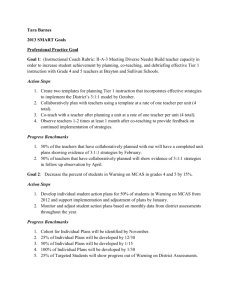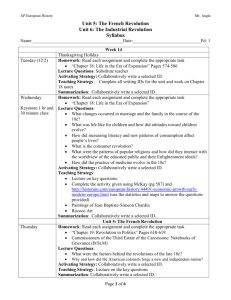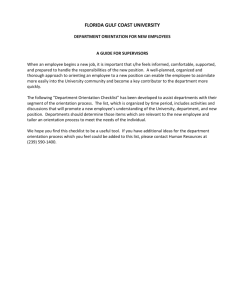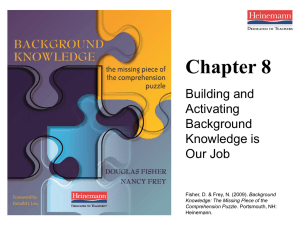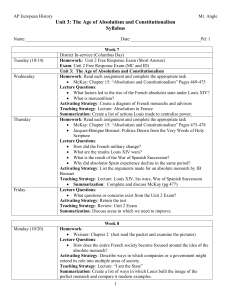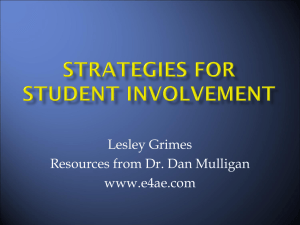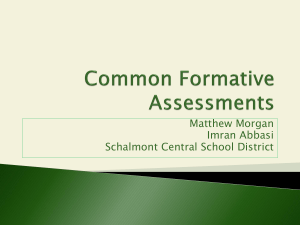Unit 4: The Eighteenth Century Syllabus
advertisement
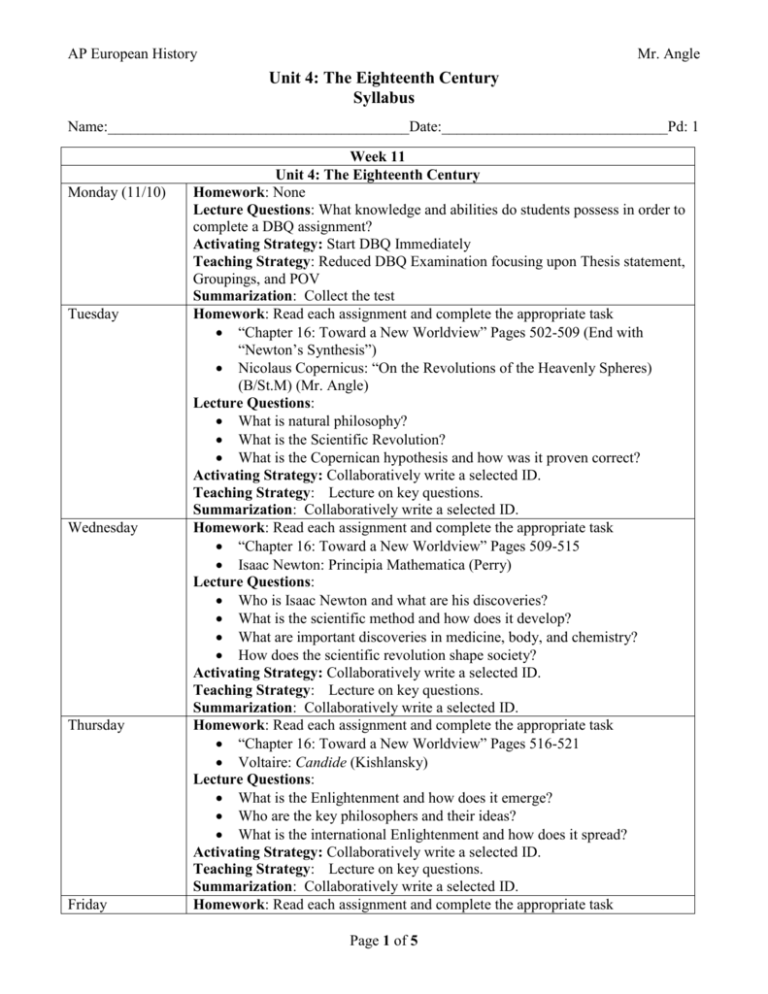
AP European History Mr. Angle Unit 4: The Eighteenth Century Syllabus Name:________________________________________Date:______________________________Pd: 1 Monday (11/10) Tuesday Wednesday Thursday Friday Week 11 Unit 4: The Eighteenth Century Homework: None Lecture Questions: What knowledge and abilities do students possess in order to complete a DBQ assignment? Activating Strategy: Start DBQ Immediately Teaching Strategy: Reduced DBQ Examination focusing upon Thesis statement, Groupings, and POV Summarization: Collect the test Homework: Read each assignment and complete the appropriate task “Chapter 16: Toward a New Worldview” Pages 502-509 (End with “Newton’s Synthesis”) Nicolaus Copernicus: “On the Revolutions of the Heavenly Spheres) (B/St.M) (Mr. Angle) Lecture Questions: What is natural philosophy? What is the Scientific Revolution? What is the Copernican hypothesis and how was it proven correct? Activating Strategy: Collaboratively write a selected ID. Teaching Strategy: Lecture on key questions. Summarization: Collaboratively write a selected ID. Homework: Read each assignment and complete the appropriate task “Chapter 16: Toward a New Worldview” Pages 509-515 Isaac Newton: Principia Mathematica (Perry) Lecture Questions: Who is Isaac Newton and what are his discoveries? What is the scientific method and how does it develop? What are important discoveries in medicine, body, and chemistry? How does the scientific revolution shape society? Activating Strategy: Collaboratively write a selected ID. Teaching Strategy: Lecture on key questions. Summarization: Collaboratively write a selected ID. Homework: Read each assignment and complete the appropriate task “Chapter 16: Toward a New Worldview” Pages 516-521 Voltaire: Candide (Kishlansky) Lecture Questions: What is the Enlightenment and how does it emerge? Who are the key philosophers and their ideas? What is the international Enlightenment and how does it spread? Activating Strategy: Collaboratively write a selected ID. Teaching Strategy: Lecture on key questions. Summarization: Collaboratively write a selected ID. Homework: Read each assignment and complete the appropriate task Page 1 of 5 AP European History Mr. Angle “Chapter 16: Toward a New Worldview” Pages 522-529 Includes Coffeehouse Culture page 526-527 Immanuel Kant: What is Enlightenment (Perry) Lecture Questions: How does the enlightenment shape urban culture and the public life? What is the Enlightenment view of race? Activating Strategy: Collaboratively write a selected ID. Teaching Strategy: Lecture on key questions. Summarization: Collaboratively write a selected ID. Monday (11/17) Tuesday Wednesday Thursday Week 12 Homework: Read each assignment and complete the appropriate task “Chapter 16: Toward a New Worldview” Pages 529-536 (recap only) Lecture Questions: What is an Enlightened Absolutist? What is the Jewish Enlightenment? Activating Strategy: Collaboratively write a selected ID. Teaching Strategy: Lecture on key questions. Summarization: Collaboratively write a selected ID. Homework: Read each assignment and complete the appropriate task “Chapter 17: The Expansion of Europe” Pages 540-549 Lecture Questions: What is the open-field legacy and enclosure? What is the Agricultural Revolution? What are the connections of the Ag Rev to the Sci. Rev.? Why is the population in Europe able to “explode”? Activating Strategy: Collaboratively write a selected ID. Teaching Strategy: Lecture on key questions. Summarization: Collaboratively write a selected ID. Homework: Read each assignment and complete the appropriate task “Chapter 17: The Expansion of Europe” Pages 549-560 Adam Smith: “The Wealth of Nations Lecture Questions: What is a cottage industry? What is the putting-out system? What are the conditions of rural textile workers? What is the Industrious Revolution? What is the role of the guild system in the 18c and how does it change? Who is Adam Smith? What is Economic Liberalism? What are the parts of the Atlantic Trade of the 17-18c? Activating Strategy: Collaboratively write a selected ID. Teaching Strategy: Lecture on key questions. Summarization: Collaboratively write a selected ID. Homework: Read each assignment and complete the appropriate task “Chapter 17: The Expansion of Europe” Pages 560-571 Robert, First Baron Clive: “Speech in the House of Commons on India” (B/St.M) Page 2 of 5 AP European History Friday Monday (11/24) Tuesday Mr. Angle Lecture Questions: What is the Atlantic Economy? What is debt peonage? What is the Atlantic Slave trade? What are the new communities of the Atlantic world? What is the colonial Enlightenment? How as trade and empire changed in Asia with the growth of European power? Activating Strategy: Collaboratively write a selected ID. Teaching Strategy: Lecture on key questions. Summarization: Collaboratively write a selected ID. Homework: DBQ Practice Exam Lecture Questions: How is a complete DBQ assembled? Activating Strategy: Review the “Basic Core” Teaching Strategy: Peer Review Summarization: Discuss the classes current understanding and uncertainties with the DBQ. Week 13 ½ Day: Class (AM Schedule) Homework: None Lecture Questions: None Activating Strategy: None Teaching Strategy: DBQ Examination (will take the entire 42 minutes) Summarization: None ½ Day: No Class (PM Schedule) Thanksgiving Holiday Thanksgiving Holiday Thanksgiving Holiday Week 14 Tuesday (12/2) Wednesday Thanksgiving Holiday Homework: Read each assignment and complete the appropriate task “Chapter 18: Life in the Era of Expansion” Pages 574-586 Lecture Questions: What changes occurred in marriage and the family in the course of the 18c? What was life like for children and how did attitudes toward children evolve? Activating Strategy: Collaboratively write a selected ID. Teaching Strategy: Lecture on key questions. Summarization: Collaboratively write a selected ID. Homework: Read each assignment and complete the appropriate task “Chapter 18: Life in the Era of Expansion” Pages 586-601 Lecture Questions: How did increasing literacy and new patterns of consumption affect people’s lives? Page 3 of 5 AP European History Mr. Angle Thursday Friday Monday (12/8) Tuesday What is the consumer revolution? What were the patterns of popular religions and how did they interact with the worldview of the educated public and their Enlightenment ideals? Activating Strategy: Collaboratively write a selected ID. Teaching Strategy: Lecture on key questions. Summarization: Collaboratively write a selected ID. Homework: None Lecture Questions: What are identifying characteristics of Medieval art What are identifying characteristics of Italian Renaissance art? What are identifying characteristics of Northern Renaissance art? What are identifying characteristics of Mannerism? What are identifying characteristics of Protestant Baroque art? What are identifying characteristics of Baroque art? What are identifying characteristics of Rococo art? Activating Strategy: Review the key ideas of the art and the task in the museum Teaching Strategy: Field Trip to Philadelphia Museum of Art Locate key artworks for each period Note the key characteristics Summarization: Discuss the key pieces of artwork that was located in the museum Homework: Read each assignment and complete the appropriate task “Chapter 18: Life in the Era of Expansion” Pages 601-605 Lecture Questions: How did the practice of medicine evolve in the 18c? Activating Strategy: Collaboratively write a selected ID. Teaching Strategy: Lecture on the key topics Complete the activity given using McKay (pg 587) and http://historum.com/european-history/44491-economic-growth-earlymodern-europe.html (use the statistics and maps to answer the questions provided) Summarization: Collaboratively write a selected ID. Week 15 Exam: Unit 4 (MC and Identification) Unit 5: The French Revolution Homework: Read each assignment and complete the appropriate task “Chapter 19: Revolution in Politics” Pages 610-619 Commissioners of the Third Estate of the Carcossone: Notebooks of Grievance (B/St.M) Lecture Questions: What were the factors behind the revolutions of the late 18c? Why and how did the American colonists forge a new and independent nation? Activating Strategy: Collaboratively write a selected ID. Teaching Strategy: Lecture on the key questions Summarization: Collaboratively write a selected ID. Page 4 of 5 AP European History Mr. Angle Page 5 of 5
